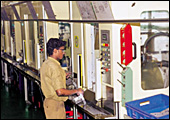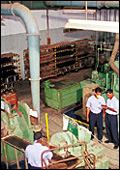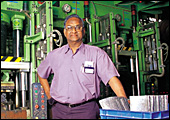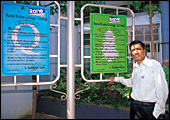 |
| Sundaram-Clayton's C. Narasimhan: His
team gave India its first Deming |
Last
year in October, when employees at the Chennai-based Rane Brake
Linings heard that their company had won the prestigious Deming
Prize for manufacturing, there was a moment of intense celebration.
After all, the Deming Prize, named after the famous American statistician
and quality guru W. Edwards Deming who taught Japan Inc. the concept
of consistent quality, is the manufacturing world's equivalent of
the Nobel Prize, and is administered by the Union of Japanese Scientists
and Engineers (JUSE). And Rane had managed to rise to the institute's
exacting quality standards in an incredibly short period of four
years. So, how much time did the 40-year-old company spend preening?
"About 48 hours," recalls S. Sunder Ram, Rane's President.
"That was before we realised that pushing the quality bar higher
would get harder still."
In fact, Ram says that Deming has made the
company's challenges so clear that he actually sees them "coming
at us much faster". Like is typical of most top executives
at Chennai's hyper-competitive auto components manufacturers, Ram
himself gets into work by quarter-past-seven in the morning to squeeze
in more into his working day. "If we had five projects to work
on at any time five years ago, today we have 60," says Ram.
He, of course, isn't the only one breathless with excitement at
the opportunities their Deming-inspired discipline has thrown open.
"With 100 employees under me and strict delivery schedules
that I myself have suggested, there is no spare time," grins
G. Jayashankar, Manager (Production) at Rane's plant in Chennai's
Ambattur industrial estate.
If it sounds like people at Rane are "tripping",
it is because the Deming-inspired quality discipline is a serious
addiction. Once you are hooked, you are always searching for the
next "high". That could be anything: A reduction in wastage,
quicker change-over time at a machine, time and cost shaved off
a new product, better customer schedule, indeed, consistently good
food at the factory canteen. It all depends on what each of the
Deming winners-there are eight in the auto industry and two outside
of it-thinks is important to it.
INDIA'S DEMING HEROES*
2003 was a great year for India. |
| COMPANY |
YEAR |
| Sundaram-Clayton (Brakes Division) |
1998 |
| Sundaram Brake Linings |
2001 |
| TVS Motor |
2002 |
| Brakes India (Foundry Division) |
2003 |
| Mahindra & Mahindra (Farm Equipment) |
2003 |
| Rane Brake Linings |
2003 |
| Sona Koyo Steering Systems |
2003 |
| Lucas-TVS |
2004 |
| * List includes only companies
in the auto sector |
Part of that is built into the award itself.
While getting a Deming says a lot about a company's quality systems,
it in no way means perfection. That's why, after a company has won
the award, JUSE inspectors pay another visit and identify areas
for further improvement. The other part, of course, is market- driven.
Explains V.R. Janardhanam, President, Sundaram Brake Linings, which
won the Deming in November 2002: "The problem is, customer
expectation skyrockets. They say, 'well, you are a Deming company,
we expect the best from you', which makes things vastly tougher
for us."
The Search For Breakthroughs
Once a company has reached a quality level
high enough to meet the Deming standards, it usually looks for a
quantum jump in its own capabilities. That could be in a variety
of areas, including manufacturing (say, reducing defective parts
from 100 per million to zero), product development (a significant
improvement in design, engineering or cost, or all), and research
and development (say, a better technology). No surprise, then, that
all of India's Deming winners are onto something big already.
 |
| Sundaram-Clayton: Lean manufacturing
is top of the agenda |
Consider TVS Motor, which won the Deming two
years ago. Having parted ways with its technology partner of long,
Suzuki Motors, the two-wheeler company is single-mindedly building
its own competencies in product development. Its R&D team, which
consists of 400-odd engineers, has a clear roadmap, although the
company wouldn't share details of it. But it is well known that
TVS Motor plans to launch three new models every year, and has earmarked
Rs 250 crore for beefing up R&D and capacity, among other things.
Its recently-launched TVS Centra-a four-stroke, 100-cc mobike with
an innovative variable timing intelligent (VTI) engine-claims to
be the most fuel-efficient motorbike in the country, and is selling
20,000 units a month since its launch early this year.
Another Deming winner focussing its energies
on product development aimed especially at the export market, is
Rane. At present, exports fetch a bare Rs 7 crore out of Rane's
annual revenues of Rs 137 crore. The plan now is to launch at least
six to seven new products in the Western Europe and us markets.
Says Ram of Rane: "We have so many things in the works that
it's not finance but management time that's a constraint."
That apart, Rane is working to achieve major improvements in manufacturing
in terms of cost, quality and delivery.
HOW THEY DO IT
A quick look at how the eight Deming winners
keep, well, winning. |
 |
| Rane Brake Linings: Focussed |
Sundaram-Clayton: It took the company
almost eight years of focussed hard work before it felt confident
enough to apply for the Deming Prize. It helped that the company
was deeply into Total Quality Management, and continuous improvement
was a way of life. That stays six years on. "Everybody
in the organisation knows that there is only one way to proceed-and
that is forward," says C. Narasimhan, the company's President.
Sundaram Brake Linings: Unlike its group company, SBL decided
to focus more on lean manufacturing, but adopted a variety
of other tools (such as Six Sigma) to improve quality and
reduce wastage. While multiplicity of tools was not an issue,
getting employees to use them was. "Every idea had to
be sold," recalls V.R. Janardhanam, the company's President.
Today, healthy rivalry among its various factories and divisions
keeps the employees pushing harder.
TVS Motor: Since the company is also managed by Venu Srinivasan
of Sundaram- Clayton, it was relatively easy for it to emulate
what its sister company had done. Besides, for TVS Motor,
shoring up its skills-in manufacturing and product development-became
a question of survival after it parted ways with Suzuki. What
helped was that Srinivasan led by example. He would walk the
shopfloor and get his hands dirty to get things done.
Brakes India: Yet another TVS group company, Brakes India
set its foundry division with a stiff target. It would work
towards the Deming and TPM awards parallely. There were independent
Japanese mentors for both systems and careful synchronisation
of the two reduced worker confusion. "TQM involves total
employee involvement," quips company Executive Director,
V. Narasimhan. In return, Brakes India offers its foundry
employees and their families old-world care.
Mahindra & Mahindra: It's the only tractor company in
the world to have bagged the Deming Prize-a goal that took
it five years to achieve. Another practitioner of TQM, M&M
made full use of its quality circles, encouraging employees
to identify problems and then coming up with improvement solutions.
Its new benchmark: Toyota Motor Corporation.
Rane Brake Linings: When it embarked on its TQM journey,
there was no link between company goals and individual goals.
Employees were also a bit disconcerted with the decentralisation
of power. Now, though, they are delighted with taking "ownership"
of their work.
Sona Koyo Steering Systems: Soon after it won the Deming
Prize last year, Sona launched a back-to-basics programme.
Every one of the senior managers involved with TQM had to
work on the shopfloor at least once every month. "It
ensures that we never lose touch with reality," says
K.N. Deshmukh, Sona's COO.
Lucas-TVS: It adopted TQM in 1998, and steadily worked its
way towards the Deming. Like the other winners, it sold the
need for higher quality to its employees before TQM became
a movement.
|
The savings that accrue from reduction in wastage
and improvements in efficiency are helping this exclusive club become
even more ambitious. Take Brakes India's foundry division, which
won both the Deming and the tpm awards (the latter from the Japan
Institute of Plant Maintenance) simultaneously in 2003. Foundries
are supposed to be dirty and dangerous, but Brakes India has turned
them into a showcase piece. It wants to go higher by making its
foundry a place where castings are designed from scratch. Already,
the foundry can design new products in three-fourths the time it
used to take even six years ago. The goal, says V. Narasimhan, the
company's Executive Director, "is to become the benchmark foundry
in this respect".
 |
| Sundaram Brake Linings' V.R. Janardhanam:
Deming in the pocket; Japan Quality Medal now in his sights |
More than 2,000 km from Brake India's foundry
in Chennai, Sona Koyo Steering Systems, one of the four companies
in India that won the Deming Prize, is taking product innovation
beyond the OEM (the vehicle manufacturer) to the end consumer i.e.
the car buyer. "Last year we filed for two patents, this year
it will be six," says a proud K.N. Deshmukh, the company's
coo. At the same time, it has doubled its export target to almost
Rs 100 crore by the end of financial year 2006-07.
Some of the others are focussed on honing their
quality further. Sundaram-Clayton, India's first Deming winner and
the sole winner so far of the Japan Quality Medal (open only to
Deming winners), says that focussed improvements of more than two
decades have sharply defined what needs to be done. Top of its list:
lean manufacturing, a concept that keeps pushing efficiency, quality
and savings to newer levels. Says C. Narasimhan, President, Sundaram-Clayton:
"Lean ensures process stability, and breakthroughs are possible
only after that stability is achieved."
 |
| Rane Brake Linings' Sundar Ram: Pushing
the quality bar higher still |
Mahindra & Mahindra, the only tractor manufacturer
in the world to win the Deming Prize, wants to go "lean"
too, but at the same time it wants to strengthen product development
and manufacturing capabilities. Its benchmark: the world's most
envied corporation: Toyota. Says K.J. Davasia, President of M&M's
farm equipment business: "I think we are just about beginning
to realise our potential."
Another lean disciple, Sundaram Brake Linings
of K. Mahesh, is doing the opposite. It is emulating Clayton's example
and gunning for the Japan Quality Medal (so is M&M), even as
it fine-tunes its Total Quality Management (TQM) systems. Its immediate
goals include breakthroughs in manufacturing, design and exports.
"Learning is the same everywhere; you have to fall a couple
of times before you learn to balance the bicycle," says Janardhanam.
Except that in the case of these companies,
learning is continuous. "We keep asking our customers if they
are satisfied, and we always find that there are gaps," says
C. Narasimhan. No doubt, it's this relentless pursuit of excellence
that makes these companies stand out from among the thousands of
other auto ancillaries in India.
Cracking the Coterie
Every organisation has a small group of executives
that forms the CEO's power club. Mostly a council of the wise, it
can sometimes distance the CEO from the organisation at large. How
do savvy CEOs negotiate that pitfall?
By Supriya Shrinate
In
most corporations, it is the unwritten rule, and everybody knows
it and follows it too. That there are a handful of top executives
who actually run the business on behalf of the CEO. These are the
people who decide what new businesses the company will get into,
where the new plant will be located, who will supply the technology,
how the venture will be funded, who from among the middle management
will head it operationally... in fact, just about everything the
company does. You can call it whatever you want-the A-team, the
top management, the core group, the coterie, or the clique. But
the fact is, the organisational wheel will simply not turn without
at least one of them willing it.
Mostly, such a power club, because it is populated
by people who are not just loyal but highly competent, is a huge
asset for the CEO. But sometimes, it can take a life of its own
and hijack the organisational agenda, leading to a crisis. Indeed,
in the ongoing spat between the Ambani brothers, the younger Anil
has hinted that it may actually be his brother Mukesh's key executives
who are responsible for bringing things to a head at Reliance Industries.
But why do coteries get formed and how do they
go from good to bad? There's no one reason for it. "When people
see favouritism within the company, and the leader communicates
his preference for one colleague over another," offers N.R.
Narayana Murthy, Co-Founder Chairman and Chief Mentor of Infosys
Technologies. "Coteries flourish when the top management stops
listening to external information," adds Uday Kotak, Executive
Vice Chairman and Managing Director of Kotak Mahindra Bank. In other
words, coteries gain ground when accepted rules of good governance
break down; when personal agendas overtake organisational objectives,
and there are no, or inadequate, checks and balances on powers of
individual executives. Or when the organisation fails to develop
professional skills and an insecure CEO surrounds himself with a
bunch of yes-men. "Coteries are an aspect of a poverty of leadership,"
says B. Ramalinga Raju, Chairman of Satyam Computer Services.
It is easy to see why the existence of an all-powerful
coterie is bad for the organisation. If employees feel that it's
proximity or loyalty to the coterie, and not quality of work, that
takes them higher in the organisation, they may start feeding their
bosses information they would like to hear and not what they ought
to hear. Professionals may get passed over by sycophants for important
postings and assignments, and deals may get done that are in the
interest of the exclusive group and not the organisation. "Coterie
is the worst manifestation of internal politics in a company, and
invariably does more harm than good," says Adi Godrej, Chairman,
Godrej Group.
The Way Out
If the existence of a core group is inevitable,
then is it possible to prevent it from becoming a self-serving coterie?
Raju thinks so. "The organisation should be viewed as a network
of value-creating entities, and not a hierarchical set-up,"
he says. Take Satyam, for example. Although this Hyderabad-based
it major has a three-tier management structure (the top 50 have
independent responsibilities, the next 150 are team leaders and
the last tier comprises 300 associates), ideation is nobody's prerogative.
All employees are encouraged to think like leaders and write to
Raju if they want to. On his part, Raju e-mails all his 18,000-odd
employees once every quarter. "We are in the business of growing
leaders and the TDC (thinking, doing and communicating) is bundled
into each one of us," he points out.
At the Analjit Singh-led Max Group, coteries
are kept at bay through transparent management processes. Just like
at Satyam, any Max employee can e-mail the Chair-man or raise issues
at the two town hall meetings Singh holds every year. "Contemporarily
managed and value-led companies can demolish coteries through hr
practices, communication, and other team-building exercises,"
says Singh. Feeling stonewalled by the coterie? "Escalate,"
Singh advises. His argument: Often as the single-biggest shareholder,
the CEO or Chairman has more to lose by turning a blind eye to the
growth of an alternate or parallel power centre. At RPG, notes the
group's Vice Chairman Sanjiv Goenka, he and his brother Harsh (who's
the Chairman) maintain direct interaction with the CEOs, who in
practice report to sector heads. "We take the feedback seriously.
Where we find a coterie building up, we move quickly to dismantle
it," says Goenka.
Technology can be another potent weapon in
the war against coteries. Where processes and systems are transparent,
it would be almost impossible for a handful of executives to manipulate
data or facts to serve their own agendas. "Basing each transaction
on data instils confidence in employees, and keeps a leader's own
biases at bay," says Murthy of Infosys. Defined responsibilities
in terms of deliverables, and accountability can also help turn
a core group into an engine of growth and action.
Finally, though, it is up to the CEO to set
the agenda for his core group and rein it in when he feels that
it is straying from its mandate of maximising value for the shareholder,
not itself.
|
